Archive for the ‘Poetry’ Category
January 28, 2016 @ 7:56 pm | Filed under:
Huck,
Poetry Something there is that does love a wall,
That sends the gangly boy-limbs clambering up
And bids the mother not to fuss or call
Out words of caution, not to spoil the bliss
Of racing, arms outspread, along the bricks,
Along the road that crests the world, the whole
Huge world six cinder blocks and seven leagues
Below. The boy is king, is wind, and she
Must hush: just study shrubs in neighbors’ yards,
Imagine herself a Seventies mom, unfazed
By threats to skull, spine, ulna, femur.
He shouts, he leaps; the earth (a mother too)
Shivers, lets loose the cord of gravity
This once, just once, and also on the next
Block, the next wall, each ridge that lures
Him skyward all the long way home.
***
This week’s Poetry Friday roundup can be found at Reading to the Core.
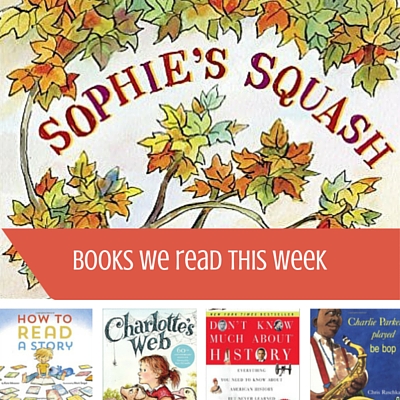
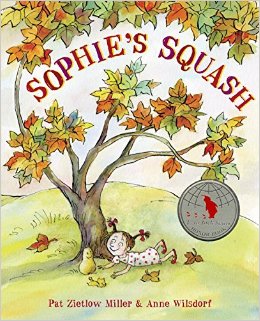 Sophie’s Squash by Pat Zietlow Miller & Anne Wilsdorf. Read to: my boys.
Sophie’s Squash by Pat Zietlow Miller & Anne Wilsdorf. Read to: my boys.
If you only pick up one new picture book for fall, let this be it. Here’s what I wrote in a Picture Book Spotlight post last year:
We first read this absolute gem of a picture book last year during the CYBILs. Fell so utterly in love with it—the lot of us—that a library copy wouldn’t do; we had to have our own. Huck and Rilla were overjoyed when I pulled it out this morning. Sophie’s instant bond with a butternut squash is utterly believable, and not just because Huck formed a similar attachment once upon a time, long before we encountered this book! “Bernice” becomes Sophie’s best friend and closest confidant, all through a bright and beautiful autumn. But as winter approaches, Bernice begins to get a bit squishy about the edges. Sophie’s parents make gentle attempts to convince Sophie it’s time to let her friend go, but since their suggestions involve treating the squash like, you know, a squash, Sophie’s having none of it. Her own solution is sweet and heartwarming, and it makes my kids sigh that contented sigh that means everything has come out exactly right.
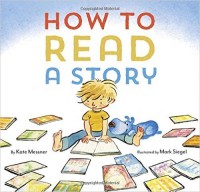 How to Read a Story by Kate Messner, illustrated by Mark Siegel. Read to: my boys.
How to Read a Story by Kate Messner, illustrated by Mark Siegel. Read to: my boys.
Well, I was sure I had posted a video of Huck reading this book last March. He was enchanted by the story from the first—a little step-by-step guide to enjoying a book with your best reading buddy, charmingly illustrated—and one day I caught him reading it out loud to himself, putting in all the voices. ::melt:
(In case the video won’t play for you, here’s a Youtube link.)
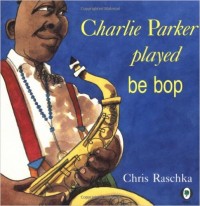 Charlie Parker Played Be Bop by Chris Raschka. Read to: my boys.
Charlie Parker Played Be Bop by Chris Raschka. Read to: my boys.
One of our longtime family favorites. The rhythm and whimsy of the text has captivated each of our small fry in turn. And the art is bold and funny and altogether wonderful.
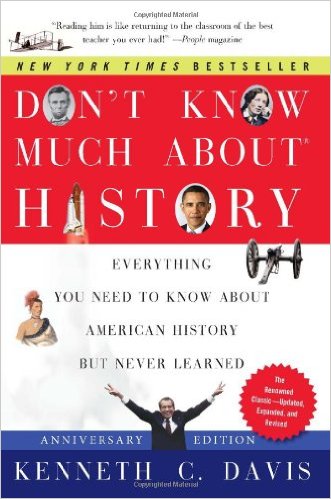 Don’t Know Much About History by Kenneth C. Davis. Read to: the teens.
Don’t Know Much About History by Kenneth C. Davis. Read to: the teens.
Another of the texts Beanie, Rose, and I are using for our 20th-century history studies. We continue to enjoy reading history texts aloud together, which allows us all to stay on the same page (literally) and—even more important—fosters discussion and fruitful rabbit trailing. We try to reserve two 45-minute blocks a week for this, supplementing with other books (including graphic novels, historical fiction, and biographies) and videos.
Poetry:
Walt Whitman, selections from “Song of Myself”
Gwendolyn Brooks, “kitchenette building”
Books Continued from Last Week:
(Rillabooks in the top row)
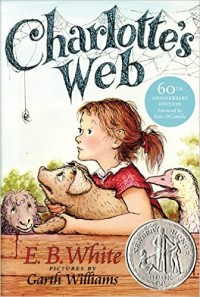
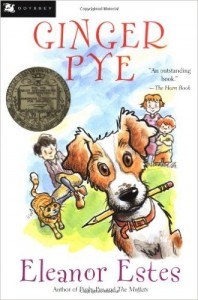
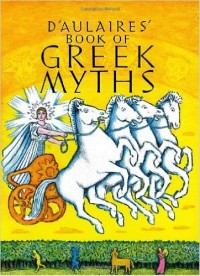
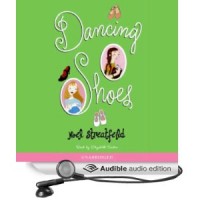
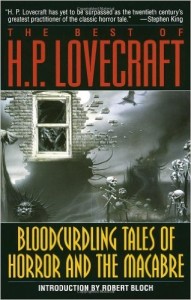
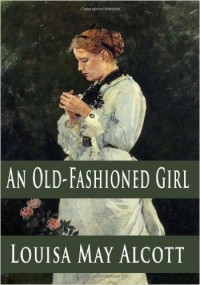
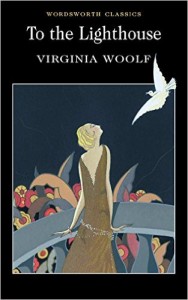
I’m nearing the end of To the Lighthouse and am feeling pretty well shattered. And I sort of want to start it all over from the beginning.
Related:
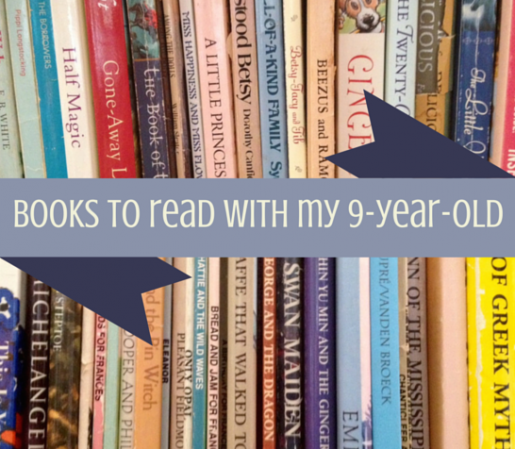
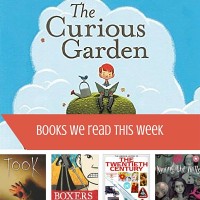
December 12, 2014 @ 8:30 am | Filed under:
Games,
Poetry I struck a deal with the kids: for every new app or game I buy them, they must each memorize a poem. So far, so fabulous. Huck, my little iPad junkie, is shaping up to be a regular minstrel by the time he’s twenty. 🙂
November 21, 2014 @ 7:23 am | Filed under:
Poetry 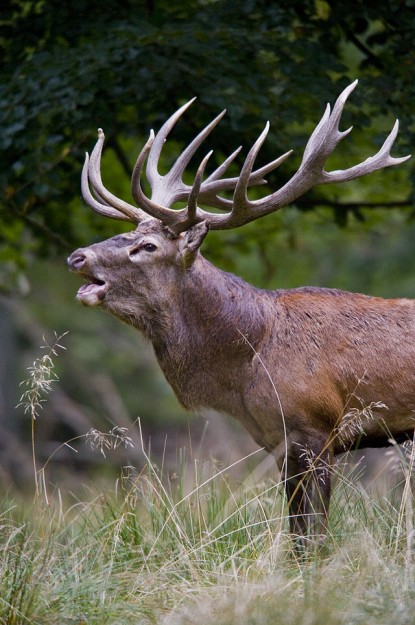
Pardon me!
Image source: Bill Ebbesen | Wikimedia Commons
Today is the last meeting of this year’s Poetry Club. The fall session was short, just six weeks (minus one when we all suddenly realized Halloween fell on a Friday). We’ve expanded to three age groups now: littles, middles, and bigs. In the older group, we’ve been looking at some poetic forms and doing close readings. Today we’re going off on a different tack and hunting up poems about food. I challenged the kids to write their own poems about food or Thanksgiving, and that’ll be the best part, seeing what they’ve come up with. 🙂
Last week in my littles group, the funniest thing happened. We were looking at animal poems, and I had put out a stack of children’s poetry books for the kids to rummage through. They would find a poem and either read it aloud or have me read it. Usually they wanted me to do the reading. We ended with the selection of one small girl from a lovely collection of nature poems. She had picked a spread that featured the medieval song “Sumer Is Icumen In” with a contemporary translation on the recto. “You read it,” she urged, sliding the book across the floor toward me. I dove in and was well underway when I remembered that one line in the middle—the one that brought my college Medieval Lit class to fits of giggles. The modern translation hewed pretty close to the original.
“Bullock starteth, buck farteth.”
This is a group of six-to-eight-year-olds. You can imagine the hilarity. That’s one poem they’ll never forget. 🙂
I really think what I love most about that poem, more even than its exuberance and exultation over the return of lovely weather, is its window on human nature. Seven hundred years later: we still enjoy a good fart joke.
September 18, 2014 @ 8:05 pm | Filed under:
Poetry Today on Twitter Sally Thomas wondered aloud what a ‘poetry-centered curriculum’ would look like, and a marvelous discussion ensued. Kortney of One Deep Drawer went to the trouble of Storifying the conversation—what a gem she is! Do hasten to her blog and enjoy it. (This link goes to her intro post, which links in turn to the Storify.)
June 23, 2014 @ 6:50 pm | Filed under:
Poetry What with getting sick the week before last and zooming back and forth to appointments last week, I never found time to write about something I absolutely must chronicle. I mean, it was only one of the finest surprises of my entire life. As I’ve mentioned, I taught a six-week poetry workshop to a group of our homeschooling friends. These were the same kids as my Journey North group; I had so much fun doing Mystery Class with them that my friend Erica (who generously hosts our meetings at her house and is a far better planner than I am) and I put our heads together and decided to start a Literature Club for this enthusiastic bunch of kids.
Our age range was wide: from a ten-year-old or two up to a number of teens, including one 18-year-old who arrived home from college midway through the session and asked, to my delight, if she could drop in. (Not Jane: her school gets out late and she missed the whole thing.)
Over the course of the six weeks, we discussed rhyme scheme and meter, many kinds of meter, and several kinds of figurative language. We had examples from lots of poets but each week (except the last) I chose one poet for close readings—someone wonderful whose work had example of the meter and/or tropes we were encountering that week. Yeats (you know I had to start with him), Frost, Hughes (Langston, not Ted), Dickinson, Blake.
We had ourselves a fantastic time. Most of our meetings ended with my giving the kid a few starter lines in a particular meter and having them form groups and finish up the poem. This was their favorite part of the class, and the group readings provided much merriment.
For our last session, I wrote a poem incorporating all their names, sorted by meter—a stanza each for our iambs, dactyls, and trochees (written in the appropriate meter), with some lines full of spondees for the single-syllable names. It ends with an appeal for an anapest: we had none in the group.
I was pretty excited about my little surprise, and they seemed to get a big kick out of it. But then they revealed they had a surprise for me: they’d all written poems to thank me for the class. They read them out loud and I was crying before the first poem was finished. These kids, they blew me away.
I sailed away with my good friends three,
Up and out to the Poet’s Tree,
There I wrote poems about sharks and dogs,
And giants galore who got smacked with fat logs
But we couldn’t have done all of this without you,
Yes Mrs. Peterson you’ve made that fact true.
—”The Poet’s Tree” by Peter H., age ten
(Peterson’s my married name, as I think most of you know.)
Couldn’t you just melt? Best thank-you gift I’ve ever been given, these poems. All the kids presented me with copies to keep, which I will forever.
Alliteration, synecdoche, and onomatopoeia,
Learned a ton,
Love you lots,
Until next time—see ya!
—lines from “My dear Melissa Peterson” by Olivia L., age 13
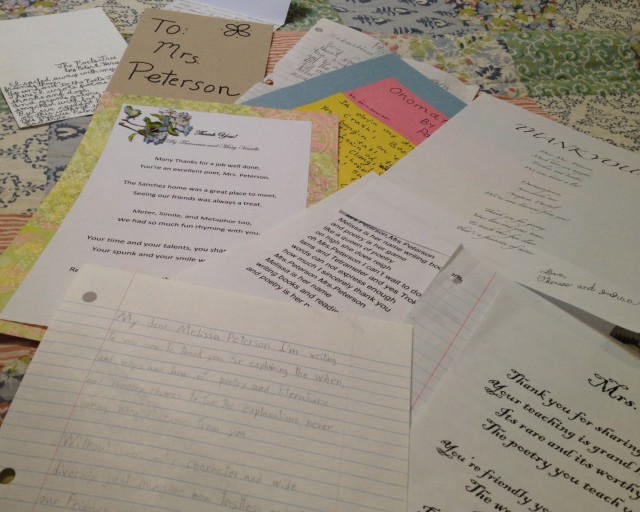
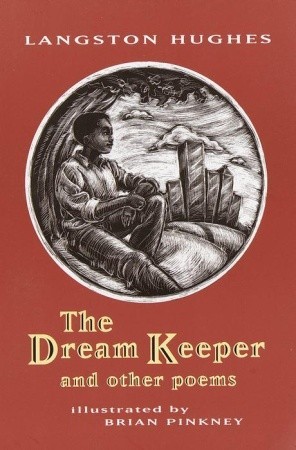 The Dream Keeper
The Dream Keeper
by Langston Hughes
Bring me all of your dreams,
You dreamer,
Bring me all your
Heart melodies
That I may wrap them
In a blue cloud-cloth
Away from the too-rough fingers
Of the world.
SUCH a great poetry class with my Journey North kids today. Iambic meter with lots of examples; personification & anthropomorphism; Langston Hughes. Lots of laughter as they thought up ending lines for an unfinished poem in iambic tetrameter. Only three more meetings to go in this short six-week session, before we break for the summer. It’s gone so fast! We’ll pick up again in a bit, though.
For the Hughes poems, I used this beautiful collection: The Dream Keeper and Other Poems, with absolutely gorgeous scratchboard illustrations by Brian Pinkney.
This week’s Poetry Friday roundup is hosted by Elizabeth Steinglass.
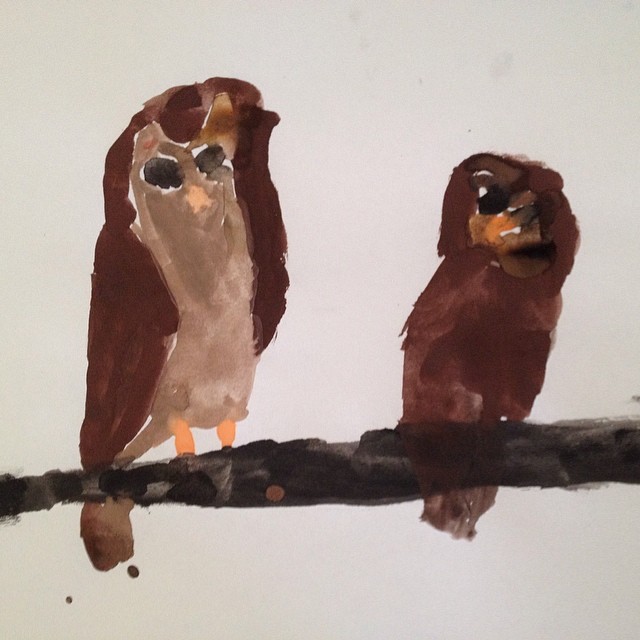
Owls by Rilla. I’m in love.
This morning’s reading:
“Passer-by, these are words…” by Yves Bonnefoy. Such a great discussion we had about this. Rose really loves this poem.
“Song: Go and Catch a Falling Star” by John Donne. Their introduction to the metaphysical poets. We’ll spend the next week or so on Donne, with a little Herbert and Marvell. Read some biographical info on Donne. I always enjoy him so much and it’s been quite a long time since I’ve read him. This meant I put a bit of time in this week reading up, refreshing my memory on these poets. Consequently I haven’t begun a new book yet—but I’ve got the Muriel Spark autobiography burning a hole on my desk.
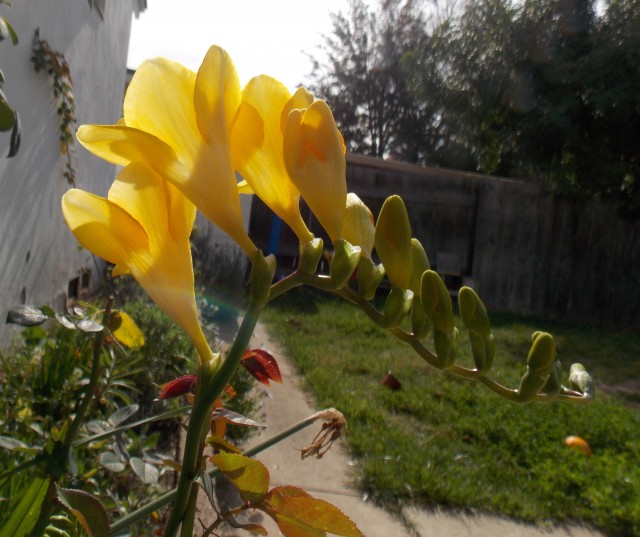
Overslept this morning, thanks to Daylight Savings Time (which I nonetheless adore) and to having stayed up past midnight, too wired from sending off a manuscript (yippee!) to sleep—or to read, for that matter. Fumbled at a crossword puzzle on my phone instead. Well, after talking at my poor exhausted husband for an hour.
So no early-morning reading for me today. And a whirl of a morning, catching up on the housework and garden work I’ve neglected these past weeks. It’s spring out there! Who knew! Loads and loads of freesia sweetening the air—almost knocked me over, the scent was so lovely and so unexpected. And the pink jasmine is blooming, and the lime tree and grapefruit (not as exciting as it sounds, those two—they don’t seem inclined to produce fruit, ever). Nasturtiums and sweet alyssum and loads and loads of lavender. I might have to live outside for a while. “I think your garden needs you, Mom,” said Rose only a little reproachfully. She’s right; the clover is overrunning everything, and let’s not even speak of the bermuda grass.
But inside, there was Spenser. We’re reading it in excerpts, with plot summary between the passages—Marshall’s English Literature for Boys and Girls is wonderful for this—if you, a 21st-century teenager, can forgive the condescending name. Today was great fun, as the girls kept spotting parallels to Narnia (Una happening upon the dancing fauns and satyrs, not to mention her devoted lion)—Rose or Beanie, which?, said “I think Lucy is supposed to be an Una, Mom.” And the description of St. George going forth unto the dragon’s darksome hole:
“And lookéd in: his glistering armour made
A little glooming light, much like a shade,
By which he saw the ugly monster plain…
Most loathsome, filthy, foul, and full of vile disdain.”
I thought of Bilbo and Smaug, but Beanie thought of Eustace. They know a lot about Tolkien’s literary credentials and influences from our Beowulf studies, and now they know about Lewis’s too. You can’t help but see it, reading Spenser.
Oh, and we returned to our Poetry 180 journey, poem #8, “Numbers” by Mary Cornish.
Now, during all this poetry-reading, Rilla was perched in her usual spot at the kitchen table, drawing, and suddenly she flitted across to the shelves behind my rocking chair and started piling up books—mostly volumes from our Poetry for Young People collection, plus Child’s Garden of Verses. Later, I found this pile on my bed. She informed me gravely that she has decided to be a poet as well as an artist, “and I’m going to need to study everything about poetry. All the poems, and the poets’ lives, and everything.”
All the poems. Well, then. No time to lose. We began with Sandburg, at her request—his “Between Two Hills” is her favorite. And then a bit of Poe (we are incapable of saying his name without belting “Poe, Edgar Allen, American poet, born in eighteen hundred and nine…“). She liked the Raven but deemed it “too long” (I can’t disagree) and said she prefers poets like Emily Dickinson who “tell a whole story in a short little poem.” I can’t argue with that, either.



















